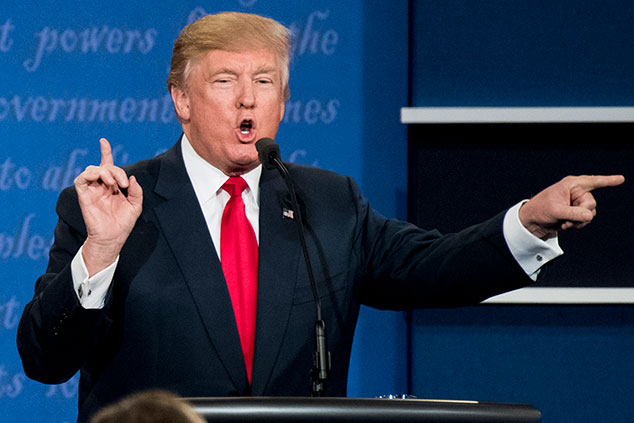
Just over a decade ago, I spent the summer working as a research analyst at an investment bank. It was a fascinating experience, and I learned a lot about drug companies, but I remember one banker telling me that, when it comes to investing, “politics doesn’t matter”. Ironically, two years later the bank’s last-ditch attempt to save itself from bankruptcy through a merger was blocked by regulators. So in the end, politics did matter.
Still, it is possible for people to become too obsessed with the impact of political change on markets. After all, neither the election of Trump nor Brexit has halted the equities bull market.
One person who has some interesting views about how investors can separate the signal from the noise when it comes to politics and investing is Dr Nick Sargen. Sargen is senior vice president and chief economist for Fort Washington Investment Advisors. He’s recently written a book called Investing in the Trump Era: How Economic Policies Impact Financial Markets, which is due to be published by Palgrave Macmillan next month. We will be reviewing it in the near future, but in the meantime, Sargen kindly took the time to answer some questions about it, and share some more general thoughts about politics and investing.
Objectivity is key for investors
Sargen was motivated to write the book by the US presidential election debates, which were “dreadful”, he says: “Issues were either not addressed or distorted”. He decided to write something that “would educate voters on long standing economic issues that surfaced during the campaign”. To avoid partisan mudslinging, he decided not to look at whether Trump’s policies were the right thing to do, but whether they “would be good, bad or ugly for financial markets”. After all, “while the markets may not be the ultimate arbitrator of the soundness of policies, they are what counts for investors”.
Given this, it’s not surprising that the overall lesson that Sargen wants readers to learn is that “people should try to be objective in understanding how policies impact the economy and markets, rather than base decisions on their political orientation”. After all, “politicians like to make assertions, many of which are false or inaccurate” (or as Trump would doubtless say, “fake news”). Sargen thinks we should focus “on what evidence-based research tells us about various issues”.
In general, “people overestimate the impact of political events”, he says. In his long Wall Street career, only two Western leaders – Margaret Thatcher and Ronald Reagan – have been “game changers” for markets; the rest have merely had “fleeting impacts”.
There is a tendency for investors to obsess over high-profile issues that could affect them personally, but which will have a relatively small effect on the stockmarket. One obvious example from the US is the ongoing debate over how “Obamacare” should be reformed.
But there are some things you just shouldn’t ignore
Still, there are some issues that investors shouldn’t ignore. Sargen “doesn’t expect a full blown trade war this year, especially with mid-term elections in November”. However, “the problem will become harder to tackle in the next few years, because the US trade deficit is likely to increase substantially”. Indeed, we could be in for a repeat of the mid-1980s, “when the US forced Japan to take actions to reduce the bilateral trade imbalance”. This policy conflict “spilled over to financial markets and was a factor contributing to the October 1987 stockmarket crash”. Car companies will also be hit by Trump’s decision to hike steel and aluminium tariffs, which are their main inputs.
Another issue that should be keeping investors awake at night is the budget deficit. In order to get a budget through Congress, “military spending was increased to satisfy Republicans and social programmes were increased to satisfy Democrats”. As a result, they “avoided making any tough decisions about how to prioritise spending when the budget deficit becomes unsustainable”.
Given this “extreme partisanship”, Sargen doesn’t hold out any hope for a sensible compromise that would get public finances under control. Overall, investors should expect the twin trade and budget deficits to “result in higher US bond yields, a stronger dollar initially, and ultimately a stockmarket sell off when the economy weakens”.
The mid-term elections next November are traditionally seen as the point at which the attention of both pundits and voters start to shift from the current incumbent to the next presidential election in 2020. It is “too early to tell” who the Democrats will nominate, but Sargen is willing to say that “markets would sell off” if the Democrats nominated Elizabeth Warren or Bernie Sanders, who he sees as an “extreme liberal”. Sargen “doesn’t see them getting the nod”. His guess is that the candidate “will be more centrist like Joe Biden” (Obama’s vice-president). If this happened, “the market impact would be neutral”.
Another issue that Sargen discusses in the book is the effect of globalisation. This has been good for companies (and therefore shareholders) “because they can outsource to cheaper jurisdictions”. However, he accepts that this process has been “bad for workers, because they are competing with lower-wage workers”. This has also led “to widening income inequality in the US and other countries, and the subsequent populist backlash”. Of course “if the trend is reversed and wages start to rise, it would squeeze profit margins”. Still, the one silver lining would be that “overall demand growth would be stronger, which might partially offset any negative effects”.